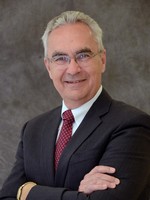A first impression was all John Matuska needed to convince him to become president and chief executive officer of Mercy Hospital in Miami.
“The primary reason I came here is that, when I visited the facility, I got a sense of what a wonderful hospital it (Mercy) would be to work in,” said Matuska, who assumed the leadership position in August, 2001. “It had a long tradition of service, and good people working there. It just needed leadership. It was having some financial problems and suffered from a lack of clear direction. But it was put together well, and I got a good feeling as soon as I arrived.” Prior to moving to Miami, Matuska served as president and CEO of Saint Peters University Hospital and Health System in New Brunswick, N.J. After earning a Bachelor of Science degree from Seton Hall University in New Jersey and his Master of Business Administration degree from New York University, he joined St. Peters in 1977, where he remained until his move to South Florida.
Matuska began his career at St. Peters as director of finance, rising to chief financial officer, executive vice president, and finally president and CEO in 1989, where his responsibilities included the administration of a 420-bed acute care hospital, a 120-bed nursing home, a foundation, a home care company, a medical services organization, and a family practice corporation.
“At St. Peters, we faced financial challenges and, for my first 12 years, I was being groomed to take over,” he said. “I was put in charge of different divisions, much like a 12-year apprenticeship.”
As president, Matuska directed the largest expansion in St. Peters history, including the construction of a medical office building, a radiation oncology center, the Hospital for Women and Children, and the Center for Ambulatory Resources. Perhaps more importantly, he greatly improved employee morale and patient satisfaction, and received numerous honors for community work, including the Torch of Liberty Award from the Anti-Defamation League in 1994 for his contributions to the well-being of the community and the State of Israel Peace Medal in 1999. He also was selected as a Community Leader of Distinction by the Middlesex Regional Chamber of Commerce in 1998 for his commitment to civic involvement and volunteerism.
Matuska brought that same commitment, innovation, and energy to Mercy Hospital, the only Catholic hospital in Miami.
“A book came out about 10 years ago called Servant Leadership and it detailed what qualities a leader should embody,” said Matuska. “The qualities we didnt find at Enron or in other such messes. Executives need integrity, and they need to be hard working, up front, and honest with people.
“You are there to serve the best interests of your customerspatients, employees, physicians, and the community. If you do this well, the rewards will come.”
The rewards have indeed come for Mercy, a comprehensive Catholic healthcare institution that serves the residents of Miami-Dade County. Among the initiatives launched since Matuskas arrival:
Prior to moving to Miami, Matuska served as president and CEO of Saint Peters University Hospital and Health System in New Brunswick, N.J. After earning a Bachelor of Science degree from Seton Hall University in New Jersey and his Master of Business Administration degree from New York University, he joined St. Peters in 1977, where he remained until his move to South Florida.
Matuska began his career at St. Peters as director of finance, rising to chief financial officer, executive vice president, and finally president and CEO in 1989, where his responsibilities included the administration of a 420-bed acute care hospital, a 120-bed nursing home, a foundation, a home care company, a medical services organization, and a family practice corporation.
“At St. Peters, we faced financial challenges and, for my first 12 years, I was being groomed to take over,” he said. “I was put in charge of different divisions, much like a 12-year apprenticeship.”
As president, Matuska directed the largest expansion in St. Peters history, including the construction of a medical office building, a radiation oncology center, the Hospital for Women and Children, and the Center for Ambulatory Resources. Perhaps more importantly, he greatly improved employee morale and patient satisfaction, and received numerous honors for community work, including the Torch of Liberty Award from the Anti-Defamation League in 1994 for his contributions to the well-being of the community and the State of Israel Peace Medal in 1999. He also was selected as a Community Leader of Distinction by the Middlesex Regional Chamber of Commerce in 1998 for his commitment to civic involvement and volunteerism.
Matuska brought that same commitment, innovation, and energy to Mercy Hospital, the only Catholic hospital in Miami.
“A book came out about 10 years ago called Servant Leadership and it detailed what qualities a leader should embody,” said Matuska. “The qualities we didnt find at Enron or in other such messes. Executives need integrity, and they need to be hard working, up front, and honest with people.
“You are there to serve the best interests of your customerspatients, employees, physicians, and the community. If you do this well, the rewards will come.”
The rewards have indeed come for Mercy, a comprehensive Catholic healthcare institution that serves the residents of Miami-Dade County. Among the initiatives launched since Matuskas arrival:
- The Miami Cancer Center at Mercy Hospital underwent a $4.3 million upgrade to its radiation oncology center as well as the addition of a new linear accelerator. Mercy also established the Orthopaedic Institute at Mercy Hospital program, which conducts basic and clinical science research while offering the most advanced hip, knee, and joint replacement procedures currently available.
- Construction of the Bayside Pavilion, a 90,000-square-foot facility, which opened its doors last October. The Center houses the outpatient surgery and endoscopy center, and the Mercy Outpatient Center, which includes a state-of-the-art womens center, a center for health promotion, nuclear imaging, and diagnostic radiology.
- Expansion in 2003 of the School of Practical Nursing form one program in a small, 1,500-square-foot facility to an 8,500-square-foot facility, enabling the Mercy LPN School to graduate three classes each year.
- A renewed commitment to employee retention, recruitment, and development. Mercy offers innovative staffing options such as the “Mercy Bid” program, which allows nurses to bid online for their preferred shift and nursing unit. In October, Mercy adopted the nursing shared governance model, which aims to give staff nurses a voice in decision-making processes that pertain to nursing practices, standards, and quality of care.
“Both St. Peters and Mercy had financial problems when I came to them and I turned both hospitals around in a very short time,” Matuska said. “It is satisfying to get back on a solid financial track. If you dont, there is no ability to hire staff, build the facility, or add new technology.”
Through Matuskas efforts, Mercy has seen its employee vacancy and turnover rates decrease and remain lower than Florida Hospital Association averages. Mercys registered nurse vacancy rate is less than 2 percent, as compared to the states 12.5 per cent. Mercys overall employee vacancy rate is about 7 per cent, as compared to an industry average of about 15 per cent. The hospital has received numerous recognitions in the areas of clinical and patient satisfaction, including awards received from prominent organizations such as HealthGrades, J.D. Power and Associates, and the Beacon Council of South Florida. Mercy also has been certified by the Florida Medical Quality Assurance, recognizing that the hospital has established an infrastructure for continuous quality improvement that meets that groups rigorous standards. Matuska sounds like a man happy with his decision to come to South Florida and accept the challenge Mercy Hospital presented. He and his wife, Paulette, live in Coconut Grove. He quickly points to the weather, the culture, and the fine dining. But mostly, he enjoys the people with whom he works. “The best part of my job is that I get to work with people, particularly people in hospitals,” Matuska said. “They are very dedicated and committed. They try to do what is in the best interest of the patients. I like seeing diverse people come together as a team. My job is to give them the tools and infrastructure so they can do their jobs.”

























